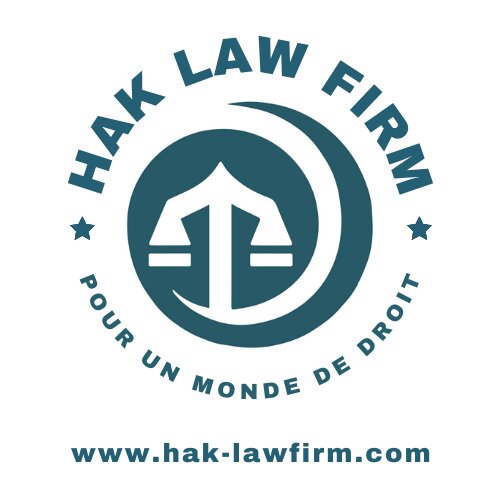Best State, Local, and Municipal Law Lawyers in DR Congo
Share your needs with us, get contacted by law firms.
Free. Takes 2 min.
Or refine your search by selecting a city:
List of the best lawyers in DR Congo
About State, Local, and Municipal Law in DR Congo
State, Local, and Municipal Law in the Democratic Republic of the Congo (DRC) governs the administrative and legal frameworks of its provinces and municipalities. These laws encompass a broad array of issues, including administrative management, land use, public services, environmental regulations, and local taxation. The DRC is divided into 26 provinces, each with a degree of legislative and administrative autonomy, allowing them to manage local governance matters. The evolution of state, local, and municipal law is driven by the need to balance national interests with local governance and development priorities, reflecting the country's commitment to decentralization and increased local self-governance.
Why You May Need a Lawyer
There are several situations where individuals or organizations might seek legal help in state, local, and municipal law in the DRC:
- Property Disputes: Navigating issues regarding land ownership, transfers, or disputes can be complex.
- Local Business Regulations: Entrepreneurs may require assistance in understanding local regulatory requirements for establishing or operating businesses.
- Environmental Concerns: Companies or individuals dealing with agriculture or mining may need guidance on complying with local environmental laws.
- Taxation Issues: Understanding municipal tax obligations and potential disputes with local tax authorities.
- Public Services: Interactions with municipal agencies over services such as water, waste management, and education can require legal clarification or action.
- Administrative Law: Engaging with local governments over issues such as permits, licenses, or administrative decisions may necessitate legal guidance.
Local Laws Overview
The following are key aspects of local laws relevant to state, local, and municipal law in the DRC:
- Decentralization Laws: These laws guide the transfer of responsibilities and resources from central to local authorities, aiming for more effective local governance.
- Land and Property Laws: These laws dictate the procedures for land registration, ownership, and dispute resolution.
- Environmental and Natural Resource Management: Local governments have jurisdiction over specific environmental protections, especially in mining and forestry areas.
- Municipal Finance Laws: Cover regulations on local taxation, budgeting, and financial management to promote fiscal responsibility and transparency.
- Public Health and Safety Regulations: Encompass local ordinances on public health, policing, and safety protocols.
Frequently Asked Questions
What is the role of provincial governments in the DRC?
Provincial governments in the DRC have administrative and legislative powers to manage local matters, derive revenue, and execute certain national policies at a local level.
How does the legal system address property disputes?
Legal mechanisms in the DRC include mediation, arbitration, or litigation in local courts to resolve property disputes.
What are the steps to establish a business locally?
Businesses need to register with local authorities, adhere to tax codes, obtain necessary permits, and comply with local business regulations.
How can environmental law compliance be ensured?
Compliance is ensured by adhering to provincial and national environmental standards, obtaining necessary permits, and periodic environmental audits.
What should I do if I receive a municipal tax notice?
It's advisable to review the notice, verify its accuracy, and seek clarification from local tax offices or consult with a lawyer if discrepancies arise.
How are local elections structured in the DRC?
Local elections are conducted to elect representatives and officials in provinces and municipalities, following national electoral guidelines.
What is the process for obtaining construction permits?
An application must be submitted to the local authorities, providing detailed plans and meeting zoning regulations and building codes.
How does one challenge an administrative decision?
Individuals may file an appeal with relevant administrative tribunals, seeking legal assistance when necessary.
What are the responsibilities of municipalities regarding public services?
Municipalities are responsible for ensuring public utilities, sanitation, road maintenance, and health services among other services.
How can one engage in local policy advocacy?
Engagement can be through community organizations, public consultations, or participation in council meetings.
Additional Resources
For further assistance, consider reaching out to the following:
- Ministry of Decentralization and Institutional Reforms: Provides information on decentralization policies and local governance initiatives.
- Local Government Associations: Offer resources and networking for local leaders and stakeholders.
- Legal Aid Clinics: Some universities or NGOs provide pro bono legal assistance and advice, especially for disadvantaged communities.
- Provincial Administration Offices: Serve as a point of contact for local regulations and municipal issues.
Next Steps
If you need legal assistance in the realm of State, Local, and Municipal Law in the DRC, consider the following steps:
- Identify the specific legal issue and research preliminary information.
- Consult legal professionals specializing in local laws who can provide tailored advice.
- Contact local bar associations for referrals to qualified lawyers.
- Review related regulations and laws at local government offices.
- Utilize available support from NGOs or local legal aid organizations.
Lawzana helps you find the best lawyers and law firms in DR Congo through a curated and pre-screened list of qualified legal professionals. Our platform offers rankings and detailed profiles of attorneys and law firms, allowing you to compare based on practice areas, including State, Local, and Municipal Law, experience, and client feedback.
Each profile includes a description of the firm's areas of practice, client reviews, team members and partners, year of establishment, spoken languages, office locations, contact information, social media presence, and any published articles or resources. Most firms on our platform speak English and are experienced in both local and international legal matters.
Get a quote from top-rated law firms in DR Congo — quickly, securely, and without unnecessary hassle.
Disclaimer:
The information provided on this page is for general informational purposes only and does not constitute legal advice. While we strive to ensure the accuracy and relevance of the content, legal information may change over time, and interpretations of the law can vary. You should always consult with a qualified legal professional for advice specific to your situation.
We disclaim all liability for actions taken or not taken based on the content of this page. If you believe any information is incorrect or outdated, please contact us, and we will review and update it where appropriate.
Browse state, local, and municipal law law firms by city in DR Congo
Refine your search by selecting a city.












